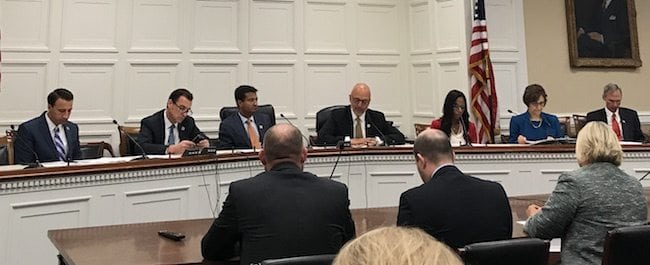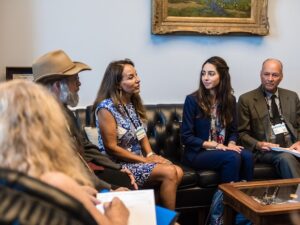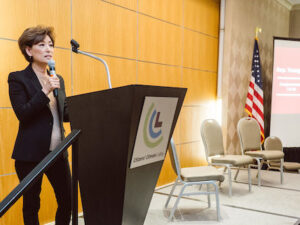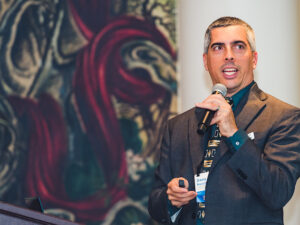
From left, Climate Solutions Caucus members Ryan Costello (R-PA), Thomas Suozzi (D-NY), Carlos Curbelo (R-FL), Ted Deutch (D-FL), Mia Love (R-UT), Suzanne Bonamici (D-OR) and Daniel Lipinski (D-IL) conduct a public briefing on the impact of climate change in coastal areas.
By Stephanie Doyle
The bipartisan House Climate Solutions Caucus held its first public meeting Wednesday with an encouraging turnout from caucus members and the public. The topic of this first briefing was the impact of climate change on coastal communities as well as looking at flood insurance and adaptation measures for ocean acidification.
Speakers at the meeting covered a range of topics, aiming to address climate effects happening now and speaking to current and future actions to respond to climate impact. Heather Carruthers, a commissioner from Monroe County, Florida, spoke to some of the issues South Florida residents are dealing with, such as rising sea levels and flooding. Her advice was to continue supporting research into projections of coastal flooding and sea level rise, as well as ensuring that counties and regions dealing with effects have the proper channels to share best practices with others facing similar problems. She touched on:
- Identifying adaptation strategies.
- Finding and being aware of vulnerabilities.
- Prioritizing projects based on cost benefit analysis.
- Reducing the root cause of the issue – greenhouse gas emissions.
Oregon State University Associate Professor of Ocean Ecology and Bio-geochemistry Dr. George G. Waldbusser spoke to the science behind ocean acidification and the potential solutions being investigated. He, too, said the first solution is to reduce the carbon dioxide emissions that end up in the oceans. Waldbusser noted that 30 percent of CO2 emissions are absorbed by the ocean, but the seas can only serve as a buffer for so long before they become saturated. Check out his 2-minute YouTube video about the impact of ocean acidification on oysters:
The final two speakers – Alec Bogdanoff, a consultant with Brizaga, Inc., and Austin Perez with the National Association of Realtors – focused on flood insurance and issues with coastal sea level rise. Both explained how it is not just coastal areas that are dealing with the problem, giving examples of states and cities that incurred flooding recently in places where flood insurance was previously not required. They also spoke to the need to continue funding for federal data used by private companies that support government flood insurance.
Members came and went during the meeting — at one point there were seven in the room — representing a wide range of states. Attending were Rep. Carlos Curbelo (R FL-26), Rep. Ted Deutch (D FL-22 ), Rep. Ryan Costello (R-PA – 06 ), Rep. Thomas Suozzi (D-NY-03), Rep. Mia Love (R-UT-04), Rep. Suzanne Bonnamici (D-OR-01), Rep. Dan Lipinski (D-IL-03), Rep. Charlie Crist (D-FL-13) and Rep. John Delaney (D-MD-06).
At the end of the event, House members asked engaging questions, and encouraged discussion on issues related to the potential extreme damage sea level rise could cause and the costs that would be bared by the government and citizens.
The Climate Solutions Caucus serves as a place for members to “get educated on economically-viable options to reduce climate risk and to explore bipartisan policy options that address the impacts, causes and challenges of our changing climate.” The caucus currently has 40 members, 20 Republicans and 20 Democrats and plans to continue the dialogue on solutions to address climate change.
The participation from the members in attendance and the wide range of states and districts that they represent — Utah, Pennsylvania, Illinois and Florida – is an encouraging sign that the caucus is moving from recruitment stage to action. The members present showed a desire to understand the issues presented and to make sure they had talking points and facts correct. The continued growth of the caucus and events like this are signs that movement towards federal climate legislation is building steam, and Citizens’ Climate Lobby members continue to provide much of that steam.





